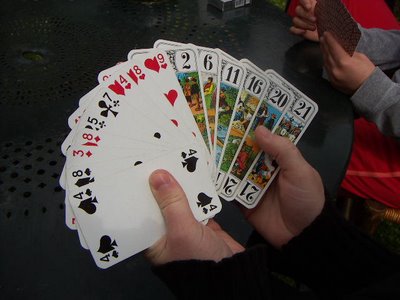
The action took place on the place du Sablon, under a tent whose painted façade evoked a fairground and whose interior reconstituted a wood-and-mirrors Brussels bistrot. I honestly didn't think the concerts were taking place there, and circled 'round the back before realising.
As I came in, Jef Neve's trio was starting "Nobody's an illegal," a title which currently has resonance on both sides of the Atlantic. The real show-stopper came later, though, with "Second Love." It was my third time hearing this tune, which will be on the recently recorded third album to be released in November, and the best yet.
"Second Love" is the kind of thing that is truly unique to the JNT and that JN is getting better and better at writing. If you remember my description of Flim Music, a justifiable criticism could be that it hews too rigidly to its structure and exposes it too harshly. SL also has several sections and metres, but they are longer and flow or transition into each other much more organically: there is no sense of counting the bars 'til the next event. From the opening amorous piano wanderings to right-hand flurries over a powerful groove to intoxicating spirals over a more sedated beat, none of it sounds forced.
One of the main motifs is a menacingly regular 10-beat bass vamp that is overlaid with brooding Radiohead-ish chords. I mentioned the similarity to Jef afterwards and from his response I gathered that he'd never really listened to Radiohead until someone gave him a CD of their's after hearing "Second Love." He seemed a little troubled by the similarity.
Next up was Flat Earth Society with guest star Elliott Sharp, but I didn't hear much as I was waiting outside for IVN's sister and her boyfriend. We were all dying of hunger and had to venture beyond the über-expensive Sablon for pita and fries.
The fête's undisputed highlight was the Philip Catherine/Sylvain Luc guitar duo. From the very first notes of "On Green Dolphin Streets" they managed to create an intimate after-hours, back-of-the-bar ambiance. They leaned back on their white plastic garden chairs, nearly constantly looked into each other's eyes and radiated immense joy in playing together and tossing ideas back and forth. It was impossible to listen and not feel happy. The entire crowd was delighted. Elliott Sharp occasionally listened in the back, his face inscrutable.
Catherine's and Luc's (which makes them sound distressingly like a couple. I guess that's what happens when two last names are on a first name basis) styles contrasted greatly, but their musical goals much less. Catherine's body language, whatever the size or prestige of the stage he happens to be on, always conveys loveably insouciant "oh, you want me to play some guitar?" informality. Luc is a much more technical player (the sheer number of ways in which his fingers extract sound from the instrument is astounding). I'd heard reports of over-virtuosity, but that was not the case here.
Some more general thoughts. Catherine is part of the Charlie Christian lineage, while Luc, although what he played bore no resemblance to gypsy jazz, belongs to Django Rheinhardt's (he did hint directly at Django when, for a few brief moments, he held his guitar nearly upright in his lap and strummed a furious gyspy rhythm). The traditional jazz guitar sound seems to deny the guitar's string instrument nature and wants to sound like breath, in emulation of a horn. Probably because this facilitates blues inflections. Discussing guitarist Chuck Wayne, Bill Crow says:
Chuck began to develop his own approach to jazz guitar when he first heard Coleman Hawkins playing "Body and Soul." Chuck wanted to create solo lines like those of Hawkins, and that prompted him to invent picking and fingering techniques that made his solos sound more like legato phrases blown through a wind instrument.
The Django tradition, though, revels in the strings. Perhaps this is because the music's other main instrument is the violin? Luc's sound is extremely stringy, sometimes to the detriment of clarity, but there was a particularly luminous moment at the end of one tune, when he played a sort of fingerstyle high on the neck and sounded just like a harp's middle register.
The day-long festivities ended with
Ntoumos, which is a funky/drum'n'bass/electro jazz quartet (joined by a singer/rapper/poet) led by trumpeter Dominic Ntoumos. Good, hip party band. It was interesting to contrast Ntoumos's drummer's crisp post-d'n'b funk playing with Teun Verbruggen's (who played with the JNT and FES) far woolier, yet no less contemporary, style.










